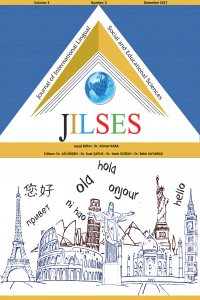GENÇ YETİŞKİN, YETİŞKİN VE YAŞLI ANADOLU ERKEKLERİNDE PERİOKLÜER ANTROPOMETRİK ÖLÇÜMLER
Anadolu erkeklerinde genç, yetişkin ve yaşlılarda orbital bölgeye ait normatif ölçümlerle yaşa bağlı büyüme değişikliklerini gösterilerek bilgilendirilmesi. Rastgele örnekleme yöntemi kullanılarak toplam 300 erkek (20-40 yaş arasında 100, 40-60 yaş arasında 100 ve 60 yaş ve üzeri 100 kişi) seçildi. Bütün erkekler, Frankfurt yatay düzleminde, aynı fotoğraf makinesinde ve aynı uzaklıktan (1,5 metre) fotoğrafları çekildi. Tüm fotoğraflar, Image J programı kullanılarak ölçüldü. Yaş grublarındaki yatay ölçümlerden palpebral fissür ortalaması 33,51±3,97, 32,06±3,87 ve 31,42±4.02 mm’idi. Dışkantal mesafelerin ortalaması üç grupta sırasıyla 110,15±9,18, 113,06±11,31 ve 116,26±11,69 mm’idi. Üç grubun intercantal mesafesi ortalaması sırasıyla 43,20±4,78, 48,80±6,40 ve 52,86±6,94 mm idi. İnterkantal, dışkantal ve inter pupiller mesafelerde yaş gruplarına göre istatistiksel olarak anlamlı farklılıklar vardı (p <0.05). Burun kökü ölçümünde ise istatistiksel olarak anlamlı fark yoktu (p <0.05). Orbital yapının yumuşak doku ölçümlerinden yatay palpebral fissür ölçümünde yaşa bağlı azalma gözlenirken, kemik yapının bulunduğu dış ve interkantal mesafelerde artış olduğu gözlendi. Bu çalışmada toplanan veriler, normal büyüme, gelişme, yaşlanma ve yaşlılık dönemlerinde insanların perioküler antropometrik ölçümleri için bir veri tabanı görevi görebilir. Travmaların değerlendirilmesi, kranyofasyal operasyon, teratojenik orbital yaralanmalar, yaşlanma, ölüler; kişisel tanımlama, yaşa dayalı veri bankaları içinde faydalı olabileceğimiz kanısındayız.
PERIOCULAR ANTHROPOMETRIC MEASUREMENTS IN YOUNG ADULTS, ADULTS AND OLD ANATOLIAN MEN
Information about age related normative measurement of orbital region in Anatolian men; growth changes in young adult, adult and elderly. A total of 300 men (100 between 20-40 years; 100 between 40-60 years and 100 60-up years) were selected using random sampling method. All of the men were taken photograph in the Frankfurt horizontal plane position, same photographic machine and distance (1.5 meter). All the photos were measured by using Image J programme. The means of horizontal palpebral fissure of three age groups were 33.51±3.97, 32.06±3.87 and 31.42±4.02 mm, respectively. The average of outercanthal distance of three groups were 110.15±9.18, 113.06±11.31 and 116.26±11.69 mm, respectively. The average of intercanthal distance of three groups were 43.2±4.78, 48.80±6.40 and 52.86±6.94 mm, respectively. There were statistically significant differences in intercanthal, outercanthal and inter pupillar distances according to age groups (p<0.05), but in nose root there were no statistically significant differences (p<0.05). While it was observed that age-related decline in horizontal palpebral fissure measurement from soft tissue measurements of orbital structure, there was an increase in the outer and intercanthal distances where the bone structure was involved. Data collected in the present study could serve as a data base for the human periocular anthropometric measurements during normal growth, development, aging and elderly. Evaluation of traumas, craniofacial operation, teratogenic orbital injuries, aging of living, dead person; personal identification may also useful from age based data banks.
___
- Açar Güdek M, Uzun A. Anthropometric measurements of the orbital contour and canthal distance in young Tuskish. Janatomical society of India, 64 (2015) 1-6.
- Ahmed A.A. A study of correlations within the dimensions of lower limb parts for personal identification in a Sudanese population. Sci World J; (2014) 1–6.
- Ahmed A.A. Estimation of stature using lower limb measurements in Sudanese Arabs. J Forensic Leg Med;20: (2013) 483–8.
- Ahmed, A.A. et. al. Estimation of sex from the anthropometric ear measurements of a Sudanese population, Elsevier, Legal Medicine 17, (2015) 313–319.
- Arbab-Zavar B and Nixon MS. On guided model-based analysis for ear biometrics. Computer Vision and Image Understanding 115(4), (2011) 487–502.
- Direk FK, Deniz M, Uslu AI, Doğru S. Anthropometric Analysis of Orbital Region and Age-Related Changes in Adult Women. J Craniofac Surg. 2016 Sep;27(6):1579-82.
- Iannarelli, A.V. Ear identification. Paramont Publishing Company (1989).
- Kleinberg, Krista F. Facial anthropometry as an evidential tool in forensic image comparison. PhD thesis, (2008).
- Kumar A, et. al. Automated human identification using ear imaging. Pattern Recognition,;45(3): (2011) 956-968. Available from: http://dx.doi.org/10.1016/j.patcog.2011.06.005,2011.
- Meijerman L., Sholl S. and De Conti F. et al. Exploratory study on classification and individualization of earprints, Forensic Sci Int.,140, (2004) 91–99
- Özkoçak, V., Alkaya A., Geometrik Morfometride İstatistiksel Yaklaşımlar, Gazi Kitabevi, Number of prints:1, ISBN:978-605- 344-516- 6, Türkçe (Bilimsel Kitap), (2017); Public. Number: 3527664.
- Peer, P. Cvl face database, Computer vision lab.,faculty of computer and information science, University of Ljubljana, (2005), Slovenia.
- Pete E. Lestrel. “Fourier descriptors and their applications in biology. (1997), Cambridge Univ. Press.
- Scheuer JL. Application of osteology to forensic medicine. Clin Anat ;15: (2002),297–312.
